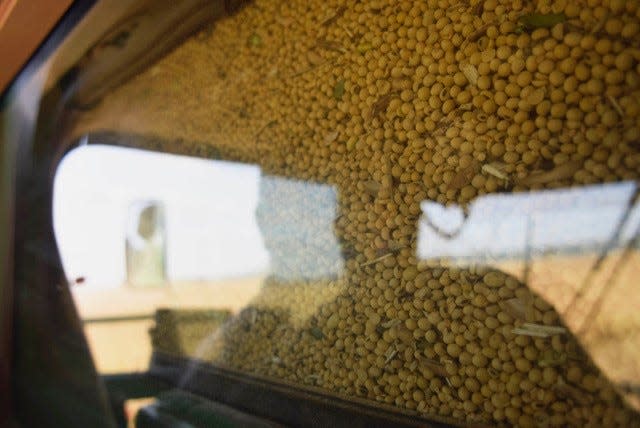Op/Ed: Hoosier farmers need Congress to enact legislation to help end worker shortage
For nearly two years, America’s producers have struggled to navigate rising input costs and a woefully unreliable stream of workers which has pushed the agricultural industry to a breaking point. As family farmers ourselves, we know firsthand that farmers in Indiana and nationwide are in trouble and recognize the pressure points that must immediately be alleviated to help this industry continue its vital work of feeding and clothing the world.
Right now, farmers can’t find enough workers to harvest their crops and food is going to waste in the field without being harvested, and our dairy farms and poultry ranches can’t find skilled workers to care for their animals despite offering competitive pay and benefits.
More:Hoosier shrimp farm, Indiana's portal to the sea, boasts 'freshest seafood for 600 miles'
Though the farmworker labor shortage is nothing new, it has now reached crisis levels, creating supply chain bottlenecks, empty store shelves and skyrocketing prices. Food costs 10% more than last year, the fastest rate of inflation in 40 years, and consumers are now feeling the aftershocks.

The laws governing immigration in the agricultural sector are outdated and haven’t been reviewed or updated in decades. Farmers and ranchers need better policies to meet workforce demands. What’s more, American families need healthy and nutritious meals at lower prices. A nation that cannot feed itself is not a secure nation.
The House of Representatives did its part in 2019 and 2021 when it passed the Farm Workforce Modernization Act on a bipartisan basis. This bill would provide legal status for farm workers if they continue to work in agriculture and take steps to get right with the law. The bill also makes critical reforms to the H-2A guest worker program, including streamlining the application process and allowing for year-round temporary agricultural workers.
Under the current H-2A program, the livestock industry is not allowed to apply for guest workers. The 1986 program was geared toward vegetable and fruit farms and seasonal workers coming to plant or harvest crops. Any bill going forward must allow for a continuous, legal workforce for all sectors of agriculture, including opening the system to the nonseasonal, experienced workers that are needed to care for animals.
More:Flavoring the world: Indiana is a prime spot for growing mint, one of few places across US
Findings in a recent and critical economic study conducted by Texas A&M show that more migrant and H-2A guest workers are correlated with higher wages for American workers and lower unemployment, as well as lower inflation. The immigrants and guest workers who come to Indiana farms and other states are skilled workers. They do difficult work in the heat and all kinds of weather — work most Americans don’t want to do.

America needs these hard workers, and we should clear onerous red tape that threatens to undermine our producer’s ability to provide the safest and most reliable food supply in the world by creating an environment of unreliable labor flow. This lack of reliable workforce for this vital industry will have devastating consequences for every sector of agriculture. For example, immigrant labor is estimated to provide care for and milk nearly 79% of the U.S. milk supply. If we lost our immigrant workers, milk prices would double, costing the U.S. economy nearly $32 billion.
Our farmers are depending on Congress to clear roadblocks standing in the way of their ability to feed, clothe and fuel the world. Without proper and expedient change, the agricultural workforce crisis will continue to challenge the global food security our farmers have dedicated their lives to creating and maintaining. This is not just an isolated crisis but one with the potential to significantly impact American families and people relying on American agriculture across the globe. We need an abundant, safe and affordable food supply and that can only happen with a stable and legal workforce. It’s time to get this legislation across the finish line; our farmers and the billions of people who rely on them depend on it.
Congressman Jim Baird represents Indiana’s 4th Congressional District and serves on the House Committee on Agriculture and the House Committee on Science, Space and Technology. Steve Obert is a fifth-generation dairy farmer and the executive director of Indiana Dairy Producers.
This article originally appeared on Indianapolis Star: Farmworkers needed, shortage at Indiana farms now at crisis levels

